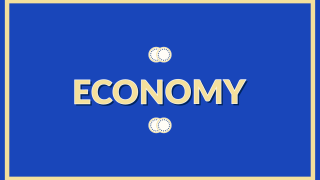“Competing pressures”, wrote Kissinger, “tempt one to believe that an issue deferred is a problem avoided; more often it is a crisis invented”. That’s how we are with the continuing postponement of solutions to the issue of economic growth.
A key question for us is why doesn’t the economy grow? Or, in other words, why did the economy grow in the sixties and why are we unable to reproduce those very conditions now? If we ask an economist, the answer would be technical and probably correct, but after diverse attempts to start the economy -many of these contradictory- growth continues to be rachitic. Years of observing this phenomenon have led me to the conclusion that the cause of the relative stagnation (because the economy is currently growing well) is due to the presence of certain key components, but only a few of these are matters of reform. The main problem resides in the absence of certainty.
Understanding the past may perhaps allow us to realize that what made the economy grow in a sustained manner and for long stretches in the fifties and sixties but not now. On posing the problem in this way we will find explanations that transcend the strictly technical. If one observes how economies such as that of Japan or Korea could grow at such high rates for so many years despite their severe internal structural deficiencies, it becomes evident that economic explanations, despite being key, are not sufficient. For there to be growth, there must be more than a healthy structure; there also must be a perception among businesspeople and investors that the country is on a clear course, that this direction is shared, at least in fundamental concerns, by the political forces overall, and that private investment is perceived as necessary and, even more than that, as a crucial component of the development of the country.
In the fifties and sixties, there was a framework of macroeconomic stability that guaranteed a clear platform for growth and impeded frequent exchange crises. More to the point, there was an implicit understanding between the government and the business community, which consisted essentially of a division of labor: the government created conditions that were favorable for growth, particularly through investment in infrastructure, while the private sector made productive investments in factories, services, and others. Of course, we’re speaking of a closed economy in an era in which nearly all economies were closed. But what is evident when one takes a backward glance is that the key is not what the specifics of the development strategy but rather, the certainty (or uncertainty) that comes along with it.
The key, or a basic key, of the success of the industrialization process of the past resides in the existence of an implicit pact with deep and transcendent moorings: behind the division of labor was found an institutional arrangement, a set of rules that were transparent, albeit sometimes implicit, for all of the participants. These rules not only implied that the government was self-limited in its reach and in the type of policies that it could implement, but also demarcated the sphere of influence in tidy and transparent fashion.
The era of economic growth founded on this kind of implicit arrangement, high profit, and clear and transparent rules of the game collapsed in the seventies in good measure because the government did not recognize the implicit pact and began to change those rules unilaterally: it abandoned an explicit policy of macroeconomic stability; gave wing to an era of inflation; imposed price controls, absurd regulations, subsidies, investment restrictions; and launched a series of expropriations, the most politically charged of which was that of the banking system. All of this violated the implicit terms of the pact that for so many years had afforded strength to the economy and certainty to the private sector. What is amazing is the longevity of the era of distrust engendered from this.
The key issue now is how to recreate the pact that established the tidy game rules and that was fundamental for achieving years of high and sustained economic growth. How, in other words, to construct institutional scaffolding that permits the country to make the decisions that are urgently required for its development in the political as well as the economic ambit. Part of the problem today lies in the diversity of authorities exercising jurisdiction over an enterprise’s activity, each with its own logic and motivation, but all demanding of bureaucratic satisfaction. This is what affects the small entrepreneur more than anything else. But perhaps the most important part resides in the perception that there is no long-term direction for the country, that the political forces do not have a commitment with a common objective, thus the country’s viability is always in question. This is not a problem of regulation, but THE central political problem of the country. Perhaps, if the economy were growing, many of today’s political conundrums would be easier to deal with.
In this dimension, only a political pact that commits to a common objective and to the rules for advancing in this direction could begin to construct the confidence that all societies require to prosper. Some of the participants in a pact like this would perhaps require eliminating or consolidating privileges, but those are diversionary issues. Mexico needs an explicit pact because the implicit ones have given their all. In addition, a pact of this nature would of necessity be coherent with the circumstances and realities of today’s world: that is, it could not negate the fact of globalization; the free trade agreements that already exist; and the requirements of the potential investors on whom depend, at the last analysis, the growth of the economy and employment.
Beyond the current problems with the euro, the process of European integration is an irrefutable illustration of that a legal and political environment that is sound and propitious for growth is the best prescription for the integral development of a country. It is evident that we are not European, but it is also evident that the countries that have prospered in recent decades achieved this thanks to their creating a climate of predictability that conferred certainty. There’s nothing without that.
If we aim at recovering the capacity of economic growth, we must create a new political pact and this is only possible by means of a legal framework that is enforced and not subject to abuse. This certainly cannot be constructed overnight, but if we don’t start to develop it, we’ll never get there.
Forward






Comments